Apr 16, 2013
Written by Bonnie Kane (Chicago, 2011)
It has been about 10 months since I ended my volunteer time in Chicago at Precious Blood Ministry of Reconciliation and not a day goes by that I don’t think about the lessons that I learned while there. My volunteer experience began for me with perfect timing. I had just wrapped up my final year at Rockhurst University. I was craving an escape. At first, that escape was merely to be independent, challenged in new ways and getting out of a city that I grew up in. In hindsight, I was escaping and searching for so much more.
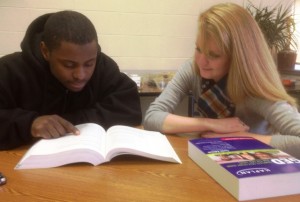
Bonnie had the opportunity to help out young men studying for their GED at the Precious Blood Ministry of Reconciliation
Since Chicago I have been through three jobs. I began by working at a hospice care business, helping with new referrals. Only a few short weeks later I got the break of a lifetime when my dream job was offered to me—working for Catholic Charities Kansas City-St. Joseph as a Foster Care Case Worker. The job was a huge challenge, and just as I began to get comfortable, Catholic Charities found out that they were losing the contract for the Foster Care program. I would be out of the job as of January 1, 2013. However, I was offered a job through Catholic Charities at their Turnaround Program, a prison re-entry program for those who are up to six months out of jail, funded by the Department of Labor. As a Case Manager, I work with clients to help them obtain education, jobs, opportunities and stable housing.
To say the least it has been a roller coaster of a year for me. I have learned something through all of these professional changes, but I have my Chicago experience to thank for preparing me and giving me the strength to go through them and come out on the other side.
I knew from an early age that I wanted to go into some kind of Social Service field, e.g., hospitals, mental health, youth, elderly, substance abuse, underprivileged, and education. Chicago taught me to be open and understanding. Talking with teens in their environment opened up my mind to so many obstacles they overcome to become successful. The experience groomed me; it started me off with an open heart, an open ear, and hope for those who have lost all hope. With these lessons and exposure I have been able to feel comfortable and somewhat successful working with children in foster care and ex-cons at the Turnaround Program. I felt prepared to take it all on.
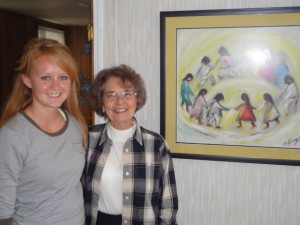
Bonnie with her community-mate, Sr. Donna Liette
Chicago changed my personal as well as my professional life. The experience gave me confidence. In social service fields one needs to be prepared for whatever walks in the door and be able to talk and stand up for oneself and one’s job if need be. Despite being on my own, I wasn’t alone. Immersing myself into my surroundings and reflecting on my life and others’ lives helped me learn about myself. I was able to re-evaluate who I was and where I was going. At the time, I was not heading in the best direction possible. Chicago forced me to meet myself all over again. The biggest lesson that I learned about myself was how strong and independent I had really become. I know now how much I can challenge myself and how much I can take on, thanks to my willingness to expand my comfort zone.
I also learned more about my faith, my spirituality and who God was to me. For some time, my faith had been dwindling. I kept running into situations that challenged me and I didn’t understand why I could never catch a break. So instead of leaning on my faith, I began to lean elsewhere. It was always still there—I attended church on Sundays and still believed—but I didn’t believe in myself and my own personal relationship with God. The first several months in Chicago were a big challenge. I was learning to live on my own, away from anything and everything that I knew. It was not all deep dish pizzas, Cubs games and sunny days. I had a personal struggle for quite a while and that struggle began with my faith. Again I asked myself and God, “What the heck am I doing here? What are you trying to show me and teach me. Once I was able to listen and to be honest, to get over myself, things began to unfold. I have all of the boys and staff at the Precious Blood Ministry of Reconciliation to thank. They taught me more about faith than I knew, and they most likely had no idea they were doing so. On my journey to find myself, I found God again as well. I began to accept hardships and learn from them. I wouldn’t be where I am today without this experience and God helping me blaze my own trail.
I cannot thank enough the staff and youth of Precious Blood Ministry of Reconciliation for the experience that I had. Chicago prepared me and gave me the experience to be successful in an everchanging non-profit profession. I learned so much more about myself and my faith. With a stronger faith, I am always looking for what is next—yet still juggling and reminding myself to live each day as is; too much planning is no fun. I like to live with a little mystery! Like I tell so many clients, just roll through the hardship and slow down during the happiness and excitement.
Bonnie Kane is a graduate of Rockhurst University and served as a Precious Blood Volunteer at Precious Blood Ministry of Reconciliation in 2011. To learn more about Precious Blood Volunteers go to www.preciousbloodvolunteers.org.
Jun 10, 2023
By Brother Tom Bohman, C.PP.S.
It seems a universal belief that we can find happiness at the right restaurant eating our favorite foods. Fish, eggplant parmigiana and ice cream are high on my list. Today we highlight a permanent food, the Most Holy Body and Blood of Christ-Corpus Christi.
This day has great significance to those who hold the banner of the Precious Blood high in their hearts and souls as Missionaries. Sometimes I think that we may not be much different than the Hebrew people wandering the desert for 40 years and complaining about quail and manna.
We value things of this earth and do not consider enough the lasting benefit of the Eucharist. Recently, a man from St. James the Less Parish, where I serve, was killed in an argument over a parking place. The value of the Blood of Christ is one of the main themes of our founder, St. Gaspar, in his lengthy retreats to villages and cities. Gaspar challenged those who do not value life during his times. We need to do the same from womb to tomb.
I enjoy a pamphlet published bi-monthly called One Bread, One Body, written by lay people in Southern Ohio. Allow me to paraphrase a thought for today from this publication. Holy Communion allows us to bridge societal divisions: between families, races, nations. It allows us to get beyond our pettiness and sense of self-importance. If we are true believers in the Eucharist we can change the world. Our hope for the future is not news filled with blood and violence. We share in the great healing mystery of togetherness with one goal. Happy Corpus Christi.
To view the full scripture reading, click here.

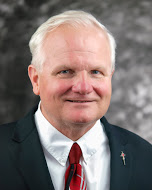
Brother Tom Bohman, C.PP.S., is in ministry at St. James the Less Church in Columbus, Ohio.
Nov 4, 2021
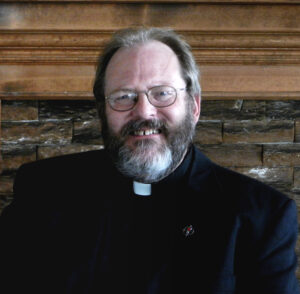 by Fr. Keith Branson, C.PP.S., Leadership Council
by Fr. Keith Branson, C.PP.S., Leadership Council
Aunt Grace was my favorite relative when I was growing up. From time to time, she visited my grandparents, who lived up the street from us, and she always made time to take my brother, sister, and me on a day trip, usually to Kansas City. We lived our lives almost exclusively around my hometown, so these excursions were exciting. We visited art galleries, museums, historical sites, and several shopping malls. It was how we learned our way around the city and the wider world.
Whenever she missed a turn or went down the wrong road, she had a very relaxed attitude; she always said, “We’ll just go around the block and enjoy the scenery.” These detours were just one more part of the adventure, a few more things for us to discover that we wouldn’t have otherwise. That attitude has served me well as I got to know other cities like Chicago or San Francisco; I was able not to panic when I went the wrong way, and I would use the detours as a chance to get to know the area better. At times I even found more places I wanted to visit or more convenient roads to travel. They expanded my life in ways beyond my intended route.
I’m sure many of us are disappointed the October assembly was postponed due to Covid. Postponement has been an ugly fact of life over these past two years, and hopefully, it has given us a chance to become more patient people. However, something is going on in the Church now that we may find helpful as we travel this detour together: the Synod of Bishops Pope Francis opened on October 10th. It is the beginning of a two-year process and will feature more participants at the synod throughout the Church than ever before in history. In a sense, Pope Francis is trying to make the entire Church a new creation.
Pope Francis sees this as “…not a parliament nor a survey of opinions, (but rather)…an ecclesial moment whose protagonist is the Holy Spirit.” Its purpose is to foster unity in the Church in the Spirit of Vatican ii, calling all baptized members of the Church to participate fully in its life. He highlighted this importance in talking about those who work for the Church: “…we must acknowledge the frustration and impatience felt by many pastoral workers, members of diocesan and parish consultative bodies and women, who frequently remain
on the fringes. Enabling everyone to participate is an essential ecclesial duty!”
There are two more quotes from the opening of the synod which caught my eye:
Let us ask: in the Church, are we good at listening? …Do we allow people to express themselves, to walk in faith even though they have had difficulties in life, and to be part of the life of the community without being hindered, rejected, or judged?
On the contrary, whenever we enter into dialogue, we allow ourselves to be challenged, to advance on a journey. And in the end, we are no longer the same; we are changed.
It’s tempting when we’re on a detour to turn off our mind and to focus on how we get back on the right road, to the exclusion of everything else. We have a great opportunity in this detour to learn more about ourselves and each other, provided we stay in dialogue. We shouldn’t stop the discernment clock here to rewind it in June. We can make a lot more progress in building a new creation than if we had kept on schedule. Just as Pope Francis says the synod isn’t a convention or a congress, our new creation cannot be just a corporation and a pastoral plan. Pope Francis says by listening to the Holy Spirit, the synod can be a process of healing. By taking this additional time to listen to the Holy Spirit together, we can better receive the gift of a New Creation.
Bibliographies are rare at the end of leadership columns, however, here are four good articles I found about the new synod’s opening:
“‘There is no need to create another church, but to create a different church,’ Francis says before synod.” https://www.americamagazine.org/faith/2021/10/09/pope-francis-synod-address-communion- participation-mission-241607
“Pope opens synod journey with reminder it’s not a convention or a congress.” https://cruxnow.com/vatican/2021/10/pope-opens-synod-journey-with-reminder-its-not-a-convention- or-a-congress/
“By listening to Holy Spirit, synod can be process of healing, pope says.” https://cruxnow.com/cns/2021/10/by-listening-to-holy-spirit-synod-can-be-process-of-healing-pope- says/
“Experts see synod as ‘biggest consultation exercise in human history’.” https://cruxnow.com/vatican/2021/10/experts-see-synod-as-biggest-consultation-exercise-in-human- history/
This article was originally published in the November 2021 issue of the New Wine Press.
Oct 12, 2021
by Phillis Fuller-Clipps, Cleveland Western Reserve, Ohio Companion
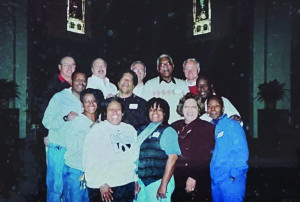 Precious Blood spirituality is the welcoming feeling you receive when you enter a parish or a room for the first time and you feel at home. It is feeling appreciated as a person; it is being welcomed to share your gifts and talents with your church community. It is being missed when you do not attend Mass. It is the overwhelming feeling of “Hey, where have you been?!” when you return to Mass after missing a few Sundays for whatever reason, with no questions or judgement. It is the love and support you receive through the struggles of life just by attending Mass.
Precious Blood spirituality is the welcoming feeling you receive when you enter a parish or a room for the first time and you feel at home. It is feeling appreciated as a person; it is being welcomed to share your gifts and talents with your church community. It is being missed when you do not attend Mass. It is the overwhelming feeling of “Hey, where have you been?!” when you return to Mass after missing a few Sundays for whatever reason, with no questions or judgement. It is the love and support you receive through the struggles of life just by attending Mass.
Our nurturing and spiritual stories as African American Catholics in Cleveland are intertwined with the history of St. Adalbert/Our Lady of the Blessed Sacrament (sa/olbs) and St. Edward parishes. Both were staffed by the Sisters of the Blessed Sacrament and Precious Blood priests, brothers, and sisters. We learned life lessons about faith, family, perseverance, and challenging work. Some of us attended Catholic schools and were taught the value of daily prayer and discipline. Some of us are converts as a result of our children becoming interested in the Catholic faith while attending St. Adalbert school.
Our introduction to Precious Blood Companions was a courtship. Our pastor invited a group of us to dinner, where he prepared the meal, we had light conversation and discussions about spirituality and Precious Blood Companions. In retrospect, he served us and taught us about Precious Blood spirituality the same way Jesus served and taught his disciples. There were about fourteen of us; nine completed the process to become Companions and have enjoyed our relationship with the Precious Blood community since 2005.
These are the lessons and charisms we learned from our Precious Blood priests and brothers for over seventy-two years, but when our parish was suppressed in 2010, we were forced to see how unloving, unwelcoming, and unappreciated we really were as African Americans in the larger Catholic Church. We visited approximately fifty churches within the Cleveland diocese. Sadly, the ethnically-centered churches (Hungarian, Sloven, Slovak, Polish etc.) tended to be the most indifferent as well as intolerant.
Because we understand that Catholicism is really “universal,” we continued undaunted and revisited places that were unwelcoming, not to intimidate or agitate, but to show that we are the Church, not our nationality or the color of our skin. Some treated us the same as the first visit, while others were more welcoming. The coldest comment we heard was, “We hope you find a parish.” The most insensitive gesture we experienced was when no one would join the line we were in for Communion but joined a separate line. During the same Mass, the priest refused to distribute the Blood of Christ, leaving it on the altar. It should be noted that though this occurred in a Hungarian parish, it is located in the heart of the African American Community. The church had the appearance of being closed, but we found the Mass schedule on the Diocesan website. Thank God for technology.
We were not looking for a church home; we were being challenged to continue the life lessons we had learned through our relationships with the Precious Blood community while appealing the decision to close our parish. We had become “Roamin’ Catholics.”
The visits had a range of eye-opening experiences, both positive and negative, and gave us opportunities to form and continue relationships. Along our journey, we met people from other churches that had been closed who appealed their parishes’ closings. Like us, some of those parishioners had begun visiting other parishes or just stopped attending Mass. The Mass was and continues to be important to us because we are one with Jesus each Sunday that we gather at the table of God and share in the Eucharist. The body and blood of Jesus sustains us always, gives us the encouragement, energy, and hope to continue.
During the appeal process, we gathered with former sa/olbs parishioners in January to celebrate Martin Luther King, Jr.; early summer for Black Catholic Sunday at the Sorrowful Mother Shrine in Bellevue, Ohio; and in the late summer for a healing Mass with Fr. Gene Wilson. We also continued to gather monthly as Companions, visit with fellow Ohio Companions for an annual gathering that rotates between Cleveland and Columbus, as well as attend retreats at Maria Stein and St. Charles.
Finally, exactly two years after our parish was closed, it was allowed to reopen. Although we were delighted, we were also heartbroken because the Precious Blood community had taken its leave from Cleveland and would not be returning. We worked through our adjustment with a diocesan priest using the circle process with the assistance of the Precious Blood community to help us express our fears, expectations, strengths, and weaknesses.
We Companions met with our new pastor and a Precious Blood priest at the main altar of our church. It was a very difficult and rewarding process. We were able to openly and honestly express how each felt about the two years without our parish, the loss of Precious Blood community, and the acceptance of a diocesan priest. We were able to acknowledge our differences and were reminded it was new situation for each of us. We shared stories of our spiritual growth and traditions. Most importantly, we learned of our similarities. We agreed to disagree and work together to glorify God and carry his message in our community.
Our new journey has been challenging. Over sixty percent of our parish members had joined a new parish, stopped attending church, changed churches, or had passed away. All of the “Roamin’ Catholics” returned to sa/olbs and have served as church leaders and organizers. Developing a relationship with our new pastor was difficult for us because we longed for the spirituality we had experienced with the Precious Blood community that wasn’t there with our new pastor. He is a wonderful person, and we have grown to know, love, and trust each other. We were blessed to learn that he had volunteered to be our pastor when he learned we would be allowed to reopen. And so we let go of the past, treasure our memories, and forge ahead with new relationships, a new beginning, and the opportunity to continue to share our lessons learned.
We continue to share our Precious Blood spirituality with everyone who attends our parish. We continued the practices and lessons learned from the Precious Blood community.
Feb 3, 2021
by Fr. Pat Patterson, C.PP.S., Cincinnati Province
How often have we heard that we are the strongest, the mightiest nation on earth? The richest nation on earth. That we are “the shining city on a hill.” One that fledgling democracies look to imitate, to find guidance and protection. And then came January the 6, 2021 when several thousand citizens stormed our nation’s capital with the seditious intention to overthrow the duly elected government. After six hours of skirmishes the police were able to restore order and Congress returned to continue the work they had begun earlier that day.
Reaction was swift. Immediately and throughout the day tweets and commentaries poured in. One of the tweets that caught my attention was that of Olympian gold medalist Simone Biles. She tweeted: “…embarrassed but not surprised…disgusted but not surprised…sad but not surprised…angry but not surprised…speechless but not surprised.” Yes, we had all these feelings and more. In a short communique the following day, president-elect Joseph Biden said, “We could see it coming.” There was no surprise.
In years to come books and books and books will be written to analyze how this happened, to investigate the words and actions and omissions that allowed this to take place. And another score of books will be written about how to make sure this doesn’t happen again, about how to strengthen our democracy, about how to make a more perfect union, a more solid and more unified nation.
Politics (and therefore governance) has come to be understood as service for the common good, a service that is born of, for and by the people. Governance (and therefore politics) is the power of service. When governance becomes anything else—the pursuit of an ideology, the pursuit of power, the pursuit of a personalized cult—then the halls of governance begin to fracture, the seeds of division take root, and the fragility of democracy is laid bare.
These days many in America feel betrayed. Fragile. Polarized. But many also feel challenged to find our way towards a more healthy, more solid democracy. A democracy truly dedicated to serve the common good. I think the way forward is found in the word “service.” A servant needs above all to be humble. There you have it. Humility. Humility comes from the Latin humus—that rich black earth which allows (encourages) seed to take root, to grow, to bloom, to bear fruit. Humility then is not weakness, but rather strength, strength that promotes life.
Yes, we need truth, hope, transparency, trust, reconciliation—all these and much more. But without the rich, life-giving ground of humility there will always be a shade of distrust, a suspicion of secrecy. A humbled nation can accept the truth. A humble leader can inspire hope and trust. Together they can work towards reconciliation. Together they (we) can build a healthier democracy and a stronger nation, stronger in the power of service to the common good of all.
Despite his own personal demons, Abraham Lincoln called the nation to listen to its better angels. Living in a time of great national division and political fragility he showed us how to be a servant for the common good. As the Civil War was winding down, just one month before General Lee surrendered, Lincoln in his second inaugural address concluded with these words: “With malice toward none, with charity for all, with firmness in the right as God gives us to see the right, let us strive on to finish the work we are in, to bind up the nation’s wounds, to care for him who shall have borne the battle and for his widow and his orphan, to do all which may achieve and cherish a just and lasting peace among ourselves and with all nations.” Truly a model of humility in victory and of service for the good of all, especially those most needy.
Almost a century and a half later a new “servant” appeared on the world stage—Pope Francis. In the homily of his inaugural Mass, he said: “Let us never forget that authentic power is service.” Sometime later he encouraged: “If we can develop a truly humble attitude, we can change the world.”
To govern with a “truly humble attitude” in no way implies that there be a lack of accountability in front of criminality. All crimes must be investigated, decisions must be taken, and the appropriate penalty applied. We are a nation of order governed by laws.
On Sunday, January 10th, 2021, Pope Francis, in reference to the violence at the U.S. Capitol a few days earlier, said: “I exhort the authorities of the State and the entire population to maintain a high sense of responsibility with the aim of calming souls, promoting national reconciliation and safeguarding the democratic values rooted in American society.”
This is a big challenge that Pope Francis has placed before us regarding the threats that have been aimed at the nation. It seems to me that there are two ways to respond to a threat. One is to feel intimidated, to cower in fear and to hide (or flee). In this case the threat (and those who level it) hold one paralyzed. The other way is to see the threat as a challenge, a call to respond and to overcome it. The threat/challenge that faces us today is perhaps the most serious since the Civil War. Our response must be equally serious. Along with the a challenge, Pope Francis also offers a possible response when he says “the authorities and the entire population” must work in cooperation in one common effort. That effort is to work together (“the authorities of the State and the entire population”) to promote the “United States of America, and (to) the Republic…, one Nation under God, indivisible with liberty and justice for all.”
This article appears in the New Wine Press, February 2021.




 by Fr. Keith Branson, C.PP.S., Leadership Council
by Fr. Keith Branson, C.PP.S., Leadership Council Precious Blood spirituality is the welcoming feeling you receive when you enter a parish or a room for the first time and you feel at home. It is feeling appreciated as a person; it is being welcomed to share your gifts and talents with your church community. It is being missed when you do not attend Mass. It is the overwhelming feeling of “Hey, where have you been?!” when you return to Mass after missing a few Sundays for whatever reason, with no questions or judgement. It is the love and support you receive through the struggles of life just by attending Mass.
Precious Blood spirituality is the welcoming feeling you receive when you enter a parish or a room for the first time and you feel at home. It is feeling appreciated as a person; it is being welcomed to share your gifts and talents with your church community. It is being missed when you do not attend Mass. It is the overwhelming feeling of “Hey, where have you been?!” when you return to Mass after missing a few Sundays for whatever reason, with no questions or judgement. It is the love and support you receive through the struggles of life just by attending Mass.